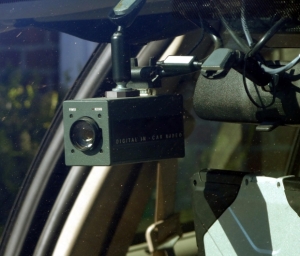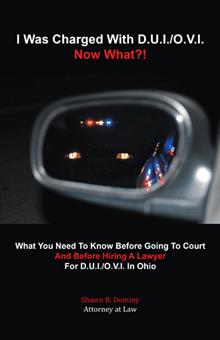I thought they were all drunk: they were driving on the wrong side of the road. But they weren’t drunk, they were just driving in Scotland. And so was I. I drove on the left, sat on the right, and shifted with my left on the endless roundabouts and turns. I navigated all the sheep, stone walls, and cliffs as I drove from the English countryside to the Scottish highlands, so I consider my recent holiday a driving success. The trip prompted me to compare the drunk driving laws of Ohio to the ‘drink driving’ laws of Scotland.
Articles Posted in DUI/OVI laws and cases
Stop For Minor Offense Outside Officer’s Jurisdiction Is Unlawful
 Suppose you are driving around Columbus on I-270 and an officer pulls you over for speeding. The officer gets out of his cruiser and walks up to your car. When the officer reaches your window, you see on his uniform he is from the Cincinnati Police Department. ‘That’s odd’, you think, ‘why is an officer from Cincinnati making a traffic stop in Columbus?’ Good question. A better question is this: does that traffic stop violate your Constitutional rights?
Suppose you are driving around Columbus on I-270 and an officer pulls you over for speeding. The officer gets out of his cruiser and walks up to your car. When the officer reaches your window, you see on his uniform he is from the Cincinnati Police Department. ‘That’s odd’, you think, ‘why is an officer from Cincinnati making a traffic stop in Columbus?’ Good question. A better question is this: does that traffic stop violate your Constitutional rights?
Supreme Court Addresses Use Of Drug Dogs At Traffic Stops
If a police officer stops you for a minor traffic violation, how long should the officer be permitted to detain you? Suppose the officer issues you a ticket or a warning for the minor traffic violation and then says he wants you to wait while he has a drug dog sniff your car? What do you say? If you say no, can the officer do it anyway?
Is Drunk Driver Responsible For Killing Drunk Man Lying In Road?
 Steven Anderson was drunk when he passed out on a rural highway. He was wearing dark clothing and went to sleep on the dark road around 1:00 am. There were no street lights in the area, and he was lying where there is a bend in the road. Darryl Saunders was drunk when he came driving around that bend. When he finally saw Anderson lying in the road, Saunders swerved to avoid him, but it was too late. He ran over Anderson, and Anderson died. Saunders’ blood alcohol concentration was tested at .150. Is Saunders criminally responsible for killing Anderson?
Steven Anderson was drunk when he passed out on a rural highway. He was wearing dark clothing and went to sleep on the dark road around 1:00 am. There were no street lights in the area, and he was lying where there is a bend in the road. Darryl Saunders was drunk when he came driving around that bend. When he finally saw Anderson lying in the road, Saunders swerved to avoid him, but it was too late. He ran over Anderson, and Anderson died. Saunders’ blood alcohol concentration was tested at .150. Is Saunders criminally responsible for killing Anderson?
Blood Tests Thrown Out In Ohio DUI/OVI Cases When Law Enforcement Fails To Follow Rules
 Sometimes rules are not made to be broken. When it comes to cases of alleged driving under the influence, there are rules for drivers, and there are rules for the government. When a driver breaks the rules, there are consequences. There are also consequences when the government breaks the rules. When the broken rules relate to blood tests, the blood tests cannot be used as evidence.
Sometimes rules are not made to be broken. When it comes to cases of alleged driving under the influence, there are rules for drivers, and there are rules for the government. When a driver breaks the rules, there are consequences. There are also consequences when the government breaks the rules. When the broken rules relate to blood tests, the blood tests cannot be used as evidence.
Dash Cam vs Officer Testimony In Ohio DUI/OVI Cases
 If an officer’s testimony about a traffic stop is not corroborated by the officer’s cruiser video, how do judges rule on the justification for a traffic stop? Once a judge makes a ruling, under what circumstances might that ruling be overturned by an appellate court? A recent case decided by the Tenth District Court of Appeals in Columbus, Ohio illustrates the discretion judges are given regarding evidentiary issues in OVI motion hearings.
If an officer’s testimony about a traffic stop is not corroborated by the officer’s cruiser video, how do judges rule on the justification for a traffic stop? Once a judge makes a ruling, under what circumstances might that ruling be overturned by an appellate court? A recent case decided by the Tenth District Court of Appeals in Columbus, Ohio illustrates the discretion judges are given regarding evidentiary issues in OVI motion hearings.
Recent Erosion Of Fourth Amendment Rights May Impact Ohio DUI/OVI Cases
Suppos e an officer detains a person for violating a traffic law and it turns out the person really didn’t violate the law: the officer was simply mistaken about what the law says. Until recently, one would expect that any evidence obtained after the mistaken detention would be thrown out. In a recent case, however, the U.S. Supreme Court concluded any evidence obtained after the officer mistakenly detained the person is not excluded from trial, so long as the officer’s mistaken belief about the law was reasonable.
e an officer detains a person for violating a traffic law and it turns out the person really didn’t violate the law: the officer was simply mistaken about what the law says. Until recently, one would expect that any evidence obtained after the mistaken detention would be thrown out. In a recent case, however, the U.S. Supreme Court concluded any evidence obtained after the officer mistakenly detained the person is not excluded from trial, so long as the officer’s mistaken belief about the law was reasonable.
School Bus Drivers And DUI/OVI In Ohio
 In the last couple weeks, two school bus drivers were suspected of being under the influence while driving a bus full of students. Both drivers were arrested for DUI, and both drivers now face serious consequences. These incidents raise the question of what happens if a school bus driver is convicted of DUI/OVI in Ohio.
In the last couple weeks, two school bus drivers were suspected of being under the influence while driving a bus full of students. Both drivers were arrested for DUI, and both drivers now face serious consequences. These incidents raise the question of what happens if a school bus driver is convicted of DUI/OVI in Ohio.
Unanimous Supreme Court Reinforces Defendant’s Right To Challenge Breath Test Results In Ohio DUI/OVI Cases
 For three decades, lawyers and judges have been misinterpreting the case of State v. Vega. In Vega, the Ohio Supreme Court held defendants in DUI/OVI cases may not attack the general reliability of breath-testing machines. Some lawyers and judges interpret Vega as if it says defendants are not permitted to make any challenge to the breath test result. This misinterpretation of the Vega decision may exist in part because most people have not actually read the decision. It’s like the telephone game where the statement made by the first person in the game is modified drastically by the time the statement is repeated by the last person in the game. A few days ago, the Ohio Supreme Court clarified the holding of Vega in a case which will hopefully end the abuse of defendants’ rights resulting from the misinterpretation of Vega.
For three decades, lawyers and judges have been misinterpreting the case of State v. Vega. In Vega, the Ohio Supreme Court held defendants in DUI/OVI cases may not attack the general reliability of breath-testing machines. Some lawyers and judges interpret Vega as if it says defendants are not permitted to make any challenge to the breath test result. This misinterpretation of the Vega decision may exist in part because most people have not actually read the decision. It’s like the telephone game where the statement made by the first person in the game is modified drastically by the time the statement is repeated by the last person in the game. A few days ago, the Ohio Supreme Court clarified the holding of Vega in a case which will hopefully end the abuse of defendants’ rights resulting from the misinterpretation of Vega.
New Book Provides Readers With Valuable Information About DUI/OVI In Ohio
 It won’t win a Pulitzer Prize, it will not be mentioned with the New York Times best sellers, and it will not be at the top of readers’ ‘wish lists’. In fact, most people may not find it very interesting. If you are charged with a DUI/OVI in Ohio, however, this book suddenly becomes a must-read. I’m talking about the new book: I Was Charged With DUI/OVI, Now What?!
It won’t win a Pulitzer Prize, it will not be mentioned with the New York Times best sellers, and it will not be at the top of readers’ ‘wish lists’. In fact, most people may not find it very interesting. If you are charged with a DUI/OVI in Ohio, however, this book suddenly becomes a must-read. I’m talking about the new book: I Was Charged With DUI/OVI, Now What?!
 Columbus OVI/DUI Attorney Blog
Columbus OVI/DUI Attorney Blog



